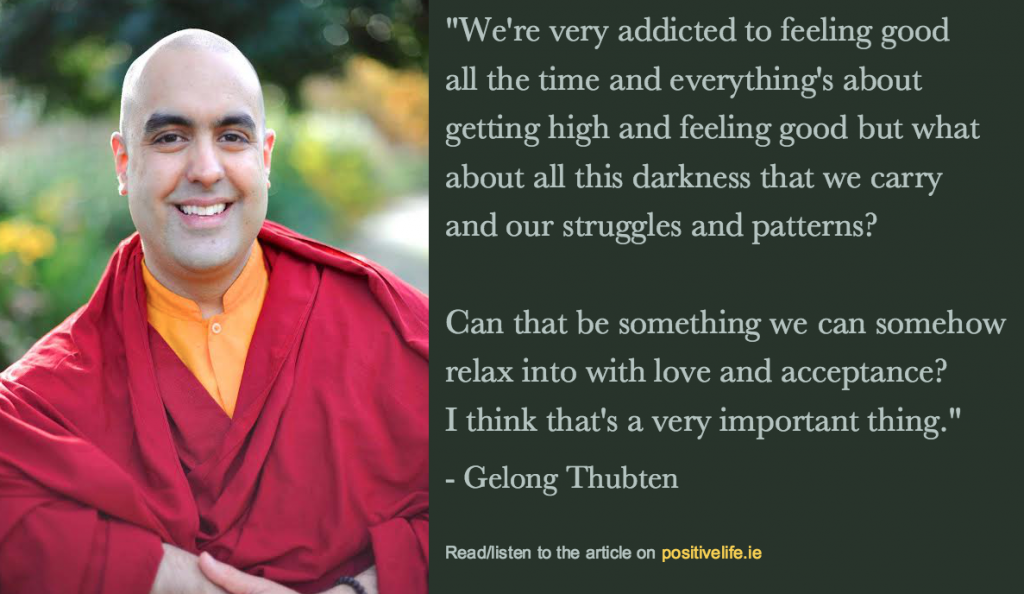
Thubten is a senior monk from the West’s largest and oldest Tibetan Buddhist monastery, Samye Ling in Scotland. He has been a monk for 22 years and has spent over five years in intensive meditation retreats. He is the director of three centres, KSD Scarborough, where he is establishing a centre for meditation, health and wellbeing, Samye Foundation Wales, a mindfulness charity, and ROKPA Switzerland, a humanitarian aid charity active in Nepal, Africa and the Tibetan areas of China.
He teaches mindfulness, meditation and Buddhist philosophy internationally, and has significant experience teaching at large companies such as Google, Clifford Chance, as well as in organisations such as hospitals, addiction rehab, prisons and schools. This Wednesday April 15th, he’ll be leading an evening of mindfulness in Dublin in conjunction with the Corporate Wellbeing Institute. This is a fundraising event for the Kagyu Samye Dzong Scarborough.
Paul asked him about spending 5 years on retreat on the Scottish Isle of Arran, which he decided to do after twelve years of being a monk. Four years is tradition at the monastery he’s with and himself and 19 others left for their four year retreat together, with Thubten eventually spending an extra year there a year after. Five months of which was spent entirely in silence, with minimal talking the rest of the time there.
“It was intense but very rewarding,” he tells Paul. “You really start to see your inner struggles and what’s really going on with you because you take away all the distractions and you really start to see what you’re like at a deeper level. So it’s beneficial because you get a deeper understanding of yourself and how to work with your habits and different sort of confusions and hang ups but also it helps you as a meditation teacher, to really experience these different meditation practices very intensively so that when you then teach them, you’ve got a good grounding in them, so you can share that with others.”
He explains that the intention is not escapism, but to develop something you can share and thus be of service.
When asked if he would do it again he enthusiastically says yes and laughs happily about how busy he is these days but that he’d like to when he has the time. “As a monk you’re supposed to spend a lot of time in meditation and on retreat but you also have to be of service, so I’m kind of in that phase, of being of service. Maybe four years is a bit long and I would do a shorter one next time.”
What was a real nugget that you learned during that time?
“It’s not really any special moment, but that you grow and learn and gain a deeper understand of your own patterns, and for me the big learning in the retreat was about emotion, and suffering and depression and stress and all of those things and how for the first half of the retreat, I was fighting against those things and hating them and resisting them and suffering from them, and how that can turn around through meditation and through really engaging with the practice very deeply and how you can start to actually accept, I learned a lot about acceptance. I used to think acceptance meant putting up with it. My teachers always said you need to accept things and I thought, how grim! That’s like grit your teeth and grin and bear it! I thought that’s what it meant.”
“The big turning point for me was when I started to think of acceptance in terms of love, acceptance is love. Having a loving experience with the present moment, even if it’s a painful one and trying to accept your emotions, almost like embracing the present reality even if it’s a painful one. Because in our culture we’re very addicted to feeling good all the time and everything’s about getting high and feeling good but what about all this darkness that we carry and our struggles and patterns? Can that be something we can somehow relax into with love and acceptance? I think that’s a very important thing.”
Listen to the full conversation below.
If you wish to book a mindfulness session with Thubten for your organisation or business you can do so by emailing/calling info@

